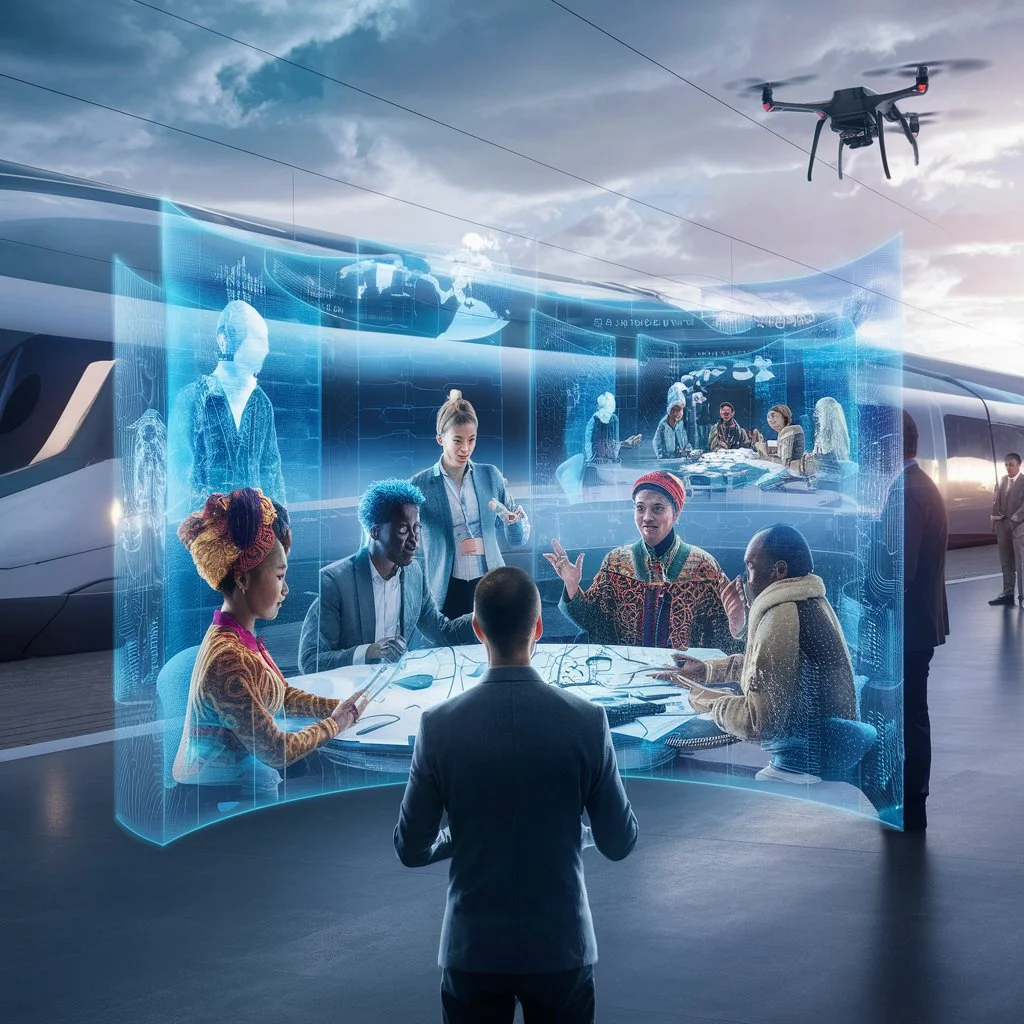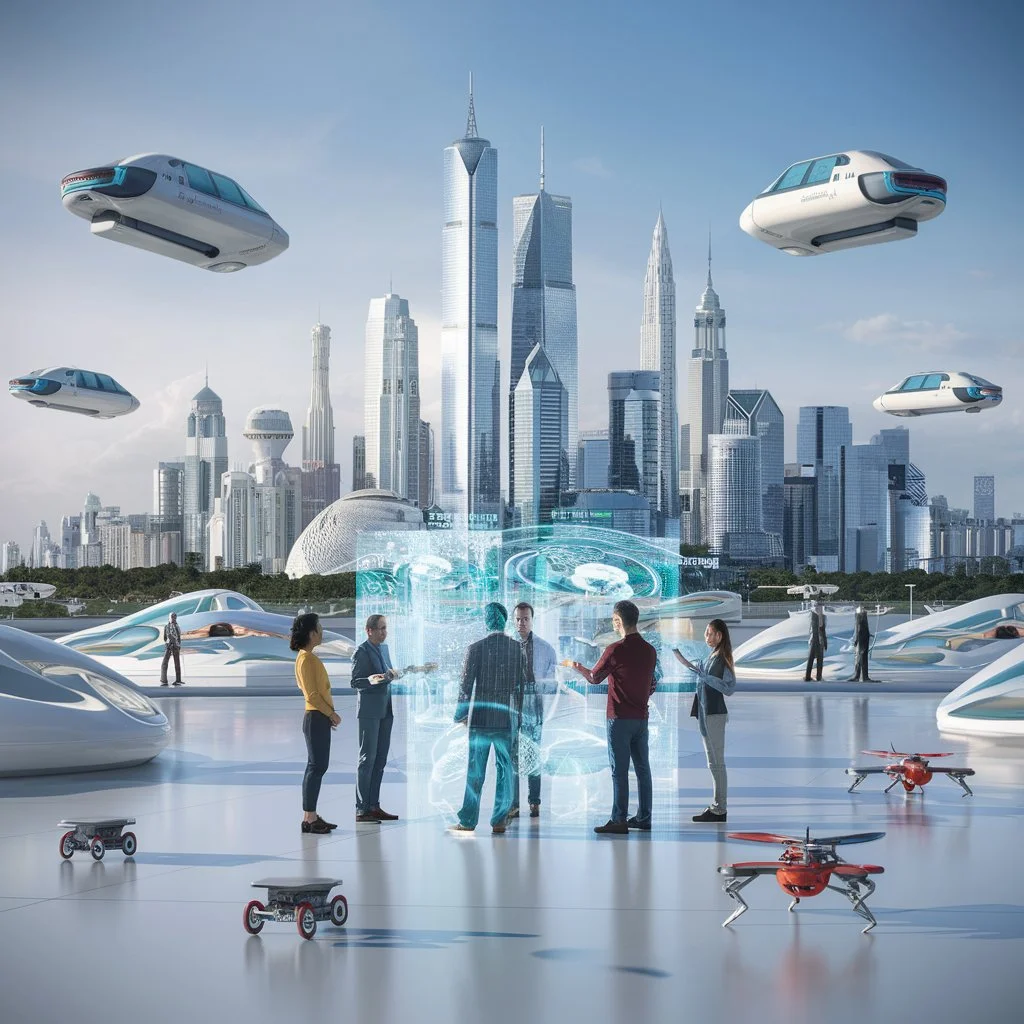Technology has been the main driving force of human progress. It is correct to say that technological advancements have continued to define the world
Technology has been the main driving force of human progress. It is correct to say that technological advancements have continued to define the world we live in from the time of the Wheel’s invention to the internet era. Therefore, before entering a new era, it remains very important to delve into and look at what technology holds for us in the future and how it could be expected to affect various aspects of our lives.

The Rapid Pace of Technological Advancements
Historical Perspective
Looking back, one cannot help but marvel at the rate of technological innovativeness. The Industrial Revolution was a giant leap forward, followed by computerization and then the advent of the internet. Each epoch had transformative moments that reoriented industries and societies.
Current Trends
There is an explosion in technological development nowadays. Innovations such as biotechnology and artificial intelligence, among others, are some sectors that are growing at breakneck speed.
Innovations in AI and Machine Learning
Various enterprises are revolutionizing due to artificial intelligence (AI) and machine learning. AI can identify new possibilities by gathering a huge amount of data and acquiring knowledge with them while dealing with autonomous cars or personalized medical treatments.
Advancements in Biotechnology
Significant advancements have also occurred within biotechnology. For instance, CRISPR gene editing techniques and breakthroughs in regenerative medicine have set the stage for novel treatment methods and potential cures for diseases that were deemed incurable earlier on.
The Future of Artificial Intelligence
AI in Everyday Life
The future will see even more advanced applications of AI, which will make life easier for everyone. Virtual assistants and smart home devices mark the beginning. This way, we improve both convenience and effectiveness, with more elaborate possibilities coming up afterward.
Ethical Considerations
Ethical considerations become increasingly important as AI evolves, making these issues more crucial than ever. Thus, it is essential that AI systems are built and utilized responsibly to avoid any unintended effects.
Privacy Concerns
Moreover, AI’s capacity to gather and analyze data poses serious privacy concerns. From now on, finding the right balance between using AI’s potential and securing individuals’ rights will be a major challenge.
AI and Job Automation
On the other hand, AI raises questions about job automation. While AI can boost productivity, it may also lead to job losses. Education and training should focus on preparing employees for these changes.
The Internet of Things (IoT)
Smart Homes and Cities
The Internet of Things (IoT) has transformed our interaction with the environment around us. Smart homes with connected devices can optimize energy, improve security, and increase overall convenience. At a wider scale, smart cities enhance urban living through efficient resource management and more effective public services.
IoT in Healthcare
Healthcare is one sector where IoT could have a significant impact. For instance, continuous health tracking is made possible through wearable devices and remote monitoring systems, which assist doctors in providing proactive care that better addresses individual needs.
Benefits of IoT
IoT offers numerous benefits, such as improved efficiency, cost reductions, and enhanced quality of life. However, addressing several hindrances remains a key challenge for stakeholders involved in this industry if they want to realize these gains.
Security Challenges
Moreover, this increased connectivity comes with its own security challenges, which require tight cybersecurity measures to safeguard against potential threats.
The Evolution of Communication
5G and Beyond
The rollout of 5 G technology will soon revolutionize communication. By providing speedier connections and reduced latency periods, 5 G will make AR/VR feasible—innovations that would not have been conceivable before. This will open doors for a more interactive experience than ever before.
Virtual Reality (VR) and Augmented Reality (AR)
VR and AR are about to metamorphose several industries, including gaming, entertainment, education, and training. These technologies can result in immersive experiences that facilitate enhanced learning and engagement.
Impact on Social Interactions
The change in communication technologies will also alter our social interactions. Though these changes offer new avenues for relating with others, they raise concerns over the quality of human contact.
Potential for Remote Work and Education
The COVID-19 pandemic has necessitated remote work and remote education. Communication technology advancements should continue to support these trends and make them more flexible, thus providing more opportunities.
Future of Transportation
Electric and Autonomous Vehicles
The transport sector is undergoing a significant transformation, characterized by electric vehicles and autonomous automobiles. These technologies can make the transportation system more efficient, improving safety and reducing emissions.
Hyperloop and Advanced Public Transit Systems
Innovations like the Hyperloop or advanced public transportation systems are transforming mass transit. Such systems might present faster modes of travel that are more efficient while being friendly to the environment rather than using traditional means.
Environmental Impact
A shift towards sustainable transportation technologies aims to reduce the environmental impact of traveling. Electric cars and advanced urban transport systems could eliminate a major chunk of per capita GHG emissions worldwide.
Regulatory Challenges
Implementing new transportation technologies also presents regulatory difficulties. For this reason, safety measures must be implemented, and privacy issues should be addressed accordingly, alongside appropriate infrastructure development for wide adoption purposes.
Space Exploration and Colonization

Commercial Space Travel
Commercial space travel has ceased to be a dream far from reach. SpaceX Blue Origin, among other companies, has taken steps toward making space journeys possible for ordinary citizens. This has opened up possibilities that have never been seen before involving exploration and tourism.
Moon and Mars Missions
Missions to the Moon or even Mars could be getting closer with the advancement of space technology. These missions could lead to scientific discoveries and pave the way for future colonization.
Technological Challenges
Space exploration presents many technological challenges, beginning with developing sustainable life support systems and ensuring safe travel and landing.
Potential Benefits for Humanity
Space exploration offers boundless possibilities. It can result in scientific breakthroughs, new technologies, and even solutions to global problems such as resource shortages or climatic changes.
Biotechnology and Healthcare Innovations
Personalized Medicine
Healthcare is being revolutionized by personalized medicine, which provides treatment based on individual genetic profiles. It promises more effective, targeted therapies, thus enhancing patient outcomes.
Genetic Engineering and CRISPR
Genetic engineering and CRISPR technology have facilitated these precise DNA alterations. Consequently, these advancements might cure genetic disorders and enhance human abilities.
Longevity and Anti-Aging Research
There is a growing interest in longevity research, among other anti-aging activities. Advances in biotechnology may increase human lifespan while improving the quality of life in old age.
Ethical Implications
This rapid progress in biotechnology also has ethical implications which need attention. We must balance potential benefits and ethical considerations as we continue exploring these unchartered territories.
Sustainable Technologies
Renewable Energy Advancements
From this perspective, renewable energy technologies, including solar power, wind power, and hydroelectricity, are vital to ensuring sustainability in the future since they help reduce reliance on fossil fuels and mitigate climate change effects.
Sustainable Agriculture
Feeding a growing global population while minimizing environmental impact requires sustainable agriculture practices like precision or vertical farming.
Impact on the Global Economy
The economic consequences of this move to sustainable technology are massive. As the existing economic structures are challenged, new industries and jobs could be formed.
Climate Change Mitigation
Technology innovation is essential to combating climate change. Technology is vital in addressing this global problem, from reducing emissions to developing new ways of capturing and storing carbon.
Conclusion
The future of technology can shape the world in unimaginable ways. This includes everything from AI and IoT to space exploration and sustainability technologies. For these resources’ potential to be achieved, it will be important for society to adopt them while dealing with moral problems and regulations. In times like now, we need to stay flexible enough to accept the exciting changes that might happen.
FAQs
What is the most promising technology for the future?
All fields have different forms of advanced technology, but artificial intelligence (AI), biotechnology, and renewable energy remain promising ones.

COMMENTS